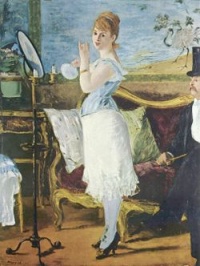Nana
From The Art and Popular Culture Encyclopedia

|
Related e |
|
Featured: |
- nini, Nana (novel), Nana (painting), Nana (mythology)
Nana, who immaculately conceived her son Attis, is a female mythological deity. Nana is also the name of a fictional character created by Émile Zola who made her first appearance in L'Assommoir, before having her own eponymous novel dedicated to her, and a painting by Manet and a series of statues by Niki de Saint Phalle.
Zola's novel Nana tells the story of a young prostitute, the novel's titular character, who rises from humble beginnings to single-handedly consuming much of the Parisian elite. Nana first appears in the end of L'Assommoir (1877), another of Zola's Rougon-Macquart series, in which she is portrayed as the daughter of an abusive drunk; in the end, she is living in the streets and just beginning a life of prostitution.
In 1877, French artist Edouard Manet exhibited "Nana", a life-size portrayal of an prostitute in undergarments, standing before her fully clothed gentleman caller. The model for it was the popular courtesan Henriette Hauser. Manet was so much taken with the description of the "precociously immoral" Nana in Zola's L'Assommoir that he gave the title "Nana" to his portrait of Henriette Hauser. The painting was rejected by the hanging committee for the Paris Salon of 1877.
Niki de Saint Phalle, when asked about her own Nanas, is reported to have stressed that it was not an intellectual connection to Zola that she was aiming at, but more a kind of "fusion" with the opulent forms of Rubens. This in a way ties in with Paulus' description of Blanche d'Antigny, the principal model for Nana: Not a beauty in the classical Greek sense. But what a complexion! What an opulence of forms! A Rubens!!
See also
- Nana, Female Nude (1911) by Lovis Corinth

